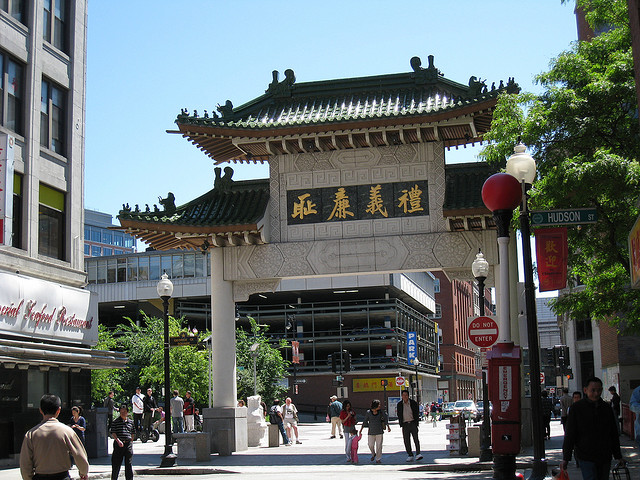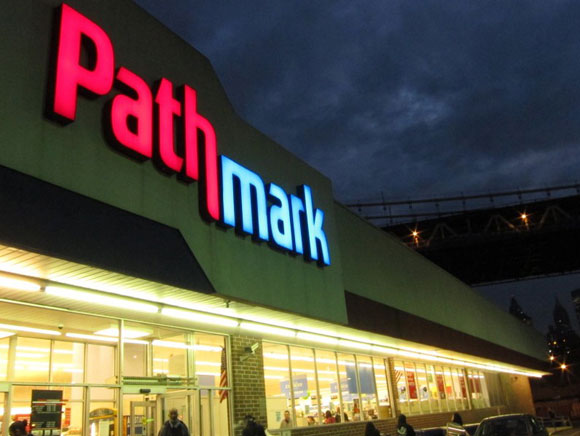This Chinatown ice cream shop refuses to melt, despite pressure from past gang violence and heat from present gentrification debates.
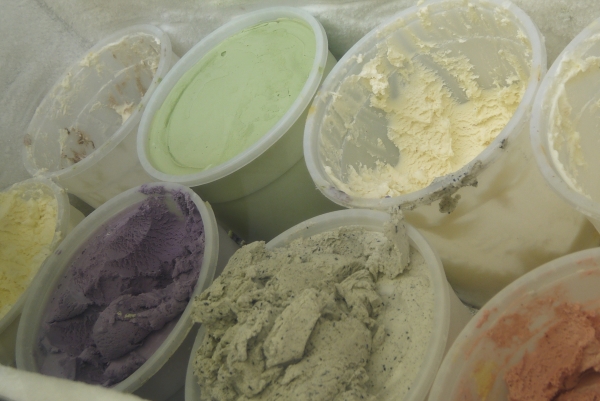
June 26, 2017
She grew up in Chinatown and worked in her family’s ice cream shop since she was 12. Through all these years, the shop survived, withstanding the many changes that have altered the landscape of Manhattan’s Chinatown. The owner of the Chinatown Ice Cream Factory, Christina Seid, shared her thoughts on small businesses, gentrification and the future of Chinatown with Open City fellow Rong Xiaoqing.
——————
“My paternal grandfather came here from Taishan as a child in the early 1900s. Taishan people are the earliest Chinese immigrants to the U.S. because Taishan was poor and everybody was starving. But basically they were going from one sucky position to another sucky position.
Back then, Chinatown was only a few Chinese people. Even when my father was growing up, Chinatown consisted of only a couple of blocks. My dad was born on Hester Street. Where they lived was considered Little Italy then. Now people call it Chinatown. I don’t know what it is technically. Chinatown is always evolving.
My dad is the middle child in a brood of seven. He had a really shitty life growing up. When he was a kid, his apartment was razed by a fire. The Italian kids used to beat him up. Then he had to fight the Hispanics, and then the Chinese gangs.
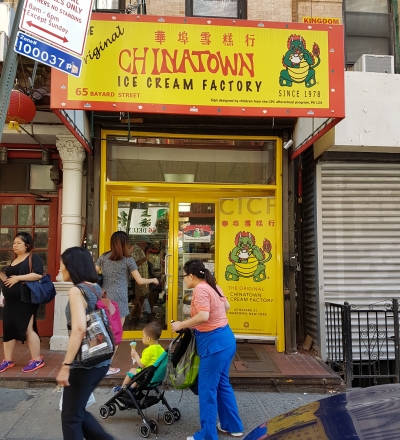
The ice cream shop has been here for 40 years. It was set up by my dad a couple of years before I was born. Chinatown wasn’t busy as it is today. It was a dangerous place, overran by gangs. My dad was always getting extortion and even death threats. He had to fight them all the time. You know the movie ‘Revenge of the Green Dragons?’ I heard it’s a pretty accurate depiction (of the gang-controlled Chinatown). But I haven’t watched it because I don’t want to be reminded of my dad getting beaten up.
I have some friends who are second-generation Chinese. Their parents want them to marry only Chinese. They have this racist sentiments because they were victimized before, which is understandable.
But when I got married to my husband, who is Filipino, my dad liked him. I have Italian friends too. I asked my dad how come he is so open. He said that’s not a race problem, but a class problem. The bullies just picked on new immigrants. And the Latinos and Italians today are not those who beat him up.
“When I see some small businesses opened by young kids and they call each other CEO, it sounds crazy to me. This is a very traditional Chinatown small business.”
I started to work at the shop when I was 12. People always say the ice cream store has looked the same. Indeed, in the old days, half of the store was a candy shop. In the back ,we used to have an arcade machine because the business was slow and we wanted to attract more customers. But too many bad kids played there and they got us into a lot of trouble. So we got rid of the arcade machine (in 1985).
You know when you are a kid, you always want to play in the park. You want to watch cartoon shows. You want to be like a kid. You don’t want to be stuck in a store for 13, 14 hours on Saturday and Sunday. In the summer, I had to stay there everyday. I had to sweep the floor and mop the counter.
Now my 15 to 20 employees, depending on the season, share cleaning responsibilities. Back then, I did the whole thing by myself. Of course I hated it.
As I grew older, the store got busier. So even when I was in college (at the University of Rochester), I came back during the holidays and the summers to work at the store. I studied psychology for my undergrad and children’s education for my master’s degree. After college, I worked as a teacher in an elementary school for a year. The reason I wanted to be a teacher was only because I had the weekends and the summers off so I could work at the shop. I always try to work around whatever the shop needs.
I took over the store in my early 20s. I expanded the T-shirt line. We used to only have yellow ones. Now we have all colors. We have printed cups now. We have printed business cards, and we have menus. We have Facebook, Twitter, Instagram accounts. These helped the business grow substantially. But we are not a big corporation.
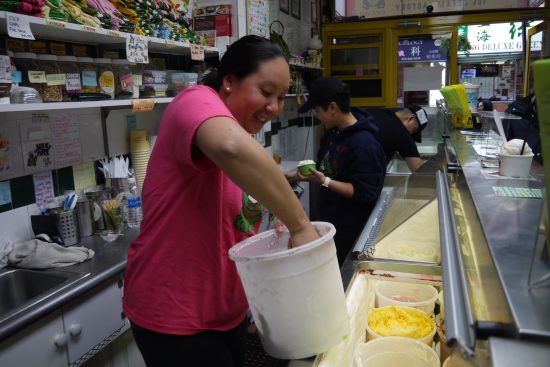
The new mentality in business now is that everyone is David Chang. Not everyone is David Chang. When I see some small businesses opened by young kids and they call each other CEO, it sounds crazy to me. This is a very traditional Chinatown small business.
People just automatically say that our customers are all tourists. Yes, there are tourists, but there are more locals – those who live in Chinatown and those from other parts of the city. On Facebook when I see people post a picture while they were in our shop, I always try to reach out to them. The other day, someone messaged me at 2 in the morning to place an order. I replied immediately. She said, ‘I couldn’t believe you are still awake.’ I think people remember those things.
“They say small business people are their own bosses and that you can decide when you work and when you don’t. Yes, but that means you have to take the risk of going out of business.”
I want to make the store a community where everybody feels welcome, a community where a bartender hugs you and comes to your wedding. There are some restaurants that used to be like that in Chinatown. Now a lot of places in New York have lost that, not just Chinatown.
Some people may think we’ve been here so long and we have guaranteed business. But, small businesses’ success is so limited. The odds are always against you. Our store has been through 9/11, when we were mandated to close by law. And during Hurricane Sandy we had no power. All my ice cream melted and I had to throw them away.
We have a very long-term lease. But on top of that you have to pay taxes, Verizon bills, Time Warner bills, insurance. I pay $3,000 a month for electricity, but in the summer, it’s $5,000. It’s like ConEd charges you whatever amount they like. But the biggest challenge for me now is work-and-life balance.
I have two young daughters. My friends took three months of maternity leave and I only had two weeks despite a C-section delivery with my younger one. They say small business people are their own bosses and that you can decide when you work and when you don’t. Yes, but that means you have to take the risk of going out of business.
I love ice cream. I am writing a children’s book about an ice cream store. It involves a lot of math concepts so kids can learn math and make it fun. I am also designing a line of luxury jewelry. It’s all in ice cream shapes, but they are made of rose gold. But I am a business person. If it doesn’t make sense, I am not going to continue it.
My sister and I always say that the ice cream shop is my dad’s first baby. We put so much care in it and we don’t want it to die. But I know that sometimes things die.
“In New York City, the property taxes are too high. The landlords sometimes raise the rent, and that means our business models have to change to keep up with the rents.”
Still, when people say Chinatown is declining, I don’t know what they mean. I think Chinatown is actually expanding. There weren’t many Chinese on East Broadway before. Now it is called Little Fuzhou because there are many immigrants from Fuzhou who settled there. It’s kind of cute that there is a name for an ethnic neighborhood within Chinatown.
In New York City, the property taxes are too high. The landlords sometimes raise the rent, and that means our business models have to change to keep up with the rents.
Some of our parents retire and yes, some people move out. But there are some young people who are moving in.
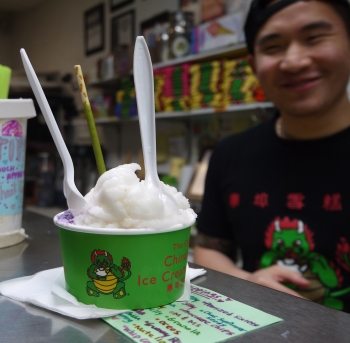
Young businesspeople get a better chance (of surviving) because they charge more. It doesn’t bother me because people outside of Chinatown are willing to pay $30 for a sandwich. They think it’s OK. In Chinatown, every time when a dumpling shop raises its price by 25 cents, everybody has a heart attack.
In five to 10 years, Chinatown will have more high-rise buildings. I know people have reservations about it because they don’t think Chinatown needs more hotels. But it does. After 9/11 and Park Row’s closure, we lost a lot of traffic. Tourists are not coming. I think hotels can help get more people into Chinatown.
I want to side with everyone else. If everybody says the developers are bad people, I want to say oh, they are. But I don’t know. I know someone who is the developer of one of such hotels. They are a Chinese family. I think if it wasn’t them, it would have been someone else. At least, this was our community people putting it up, and they hire Chinese people.
In Chinatown, people want to keep it the same. But people in Chinatown are not the same anymore.”


